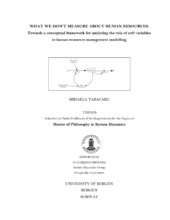What we don´t measure about human resources: towards a conceptual framework for analysing the role of soft variables in human resources management modelling
| dc.contributor.author | Tabacaru, Mihaela | eng |
| dc.date.accessioned | 2007-10-04T06:56:20Z | |
| dc.date.available | 2007-10-04T06:56:20Z | |
| dc.date.issued | 2007 | eng |
| dc.identifier.uri | https://hdl.handle.net/1956/2385 | |
| dc.description.abstract | Low retention of valuable employees and difficulties in finding qualified candidates for recruitmentare two issues managers face in Romania, but are a growing concern around the world (Deloitte,2004; Holton & Naquin, 2004). High turnover of specialists disrupts organizational continuity(Lum, et al,1998) and the current policies don’t seem to have the expected results, according to thefield study of the author. We suspect that the cause of inefficient policies lies in a misperception ofdynamics, ignorance of feedback loops and of intangible stocks, like the job satisfaction ofemployees. Although well documented in psychology literature (Lichenstein, 1998), the influence ofjob satisfaction on turnover seems to be ignored by the policy makers. We test policies that accountfor the determinants of job satisfaction and show that the outcome of such policies is better thanthe current ones. Implications for HR policy design and directions for future research are indicated. | en_US |
| dc.language.iso | eng | eng |
| dc.publisher | The University of Bergen | eng |
| dc.subject | Human resources | eng |
| dc.subject | Job satisfaction | eng |
| dc.subject | Intangible variables | eng |
| dc.subject | Misperception | eng |
| dc.subject | Attitudes | eng |
| dc.subject | Policy design | eng |
| dc.title | What we don´t measure about human resources: towards a conceptual framework for analysing the role of soft variables in human resources management modelling | eng |
| dc.type | Master thesis | en_US |
| dc.rights.holder | The author | en_US |
| dc.rights.holder | Copyright the author. All rights reserved | en_US |
| dc.subject.nsi | VDP::Matematikk og Naturvitenskap: 400::Geofag: 450 | nob |
Tilhørende fil(er)
Denne innførselen finnes i følgende samling(er)
-
Department of Geography [626]
